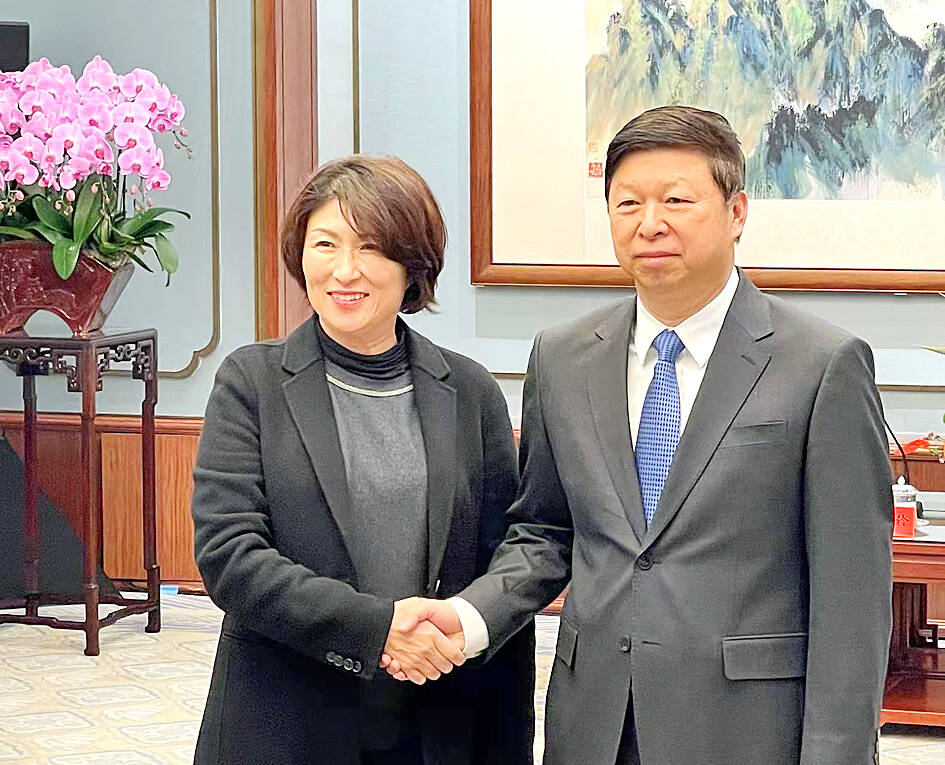The Mainland Affairs Council (MAC) is to impose stricter auditing during the approvals process for Taitung County Commissioner Yao Ching-ling’s (饒慶鈴) proposed China visits, after she failed to disclose her meeting with Chinese Taiwan Affairs Office Director Song Tao (宋濤) last month, a council official said yesterday.
In her submitted itinerary to the MAC for her Jan. 4 to 9 trip, Yao, a member of the Chinese Nationalist Party (KMT), only listed travel to Beijing on the first day, promoting agricultural goods at a fair on Jan. 5, visiting companies and commercial markets on Jan. 6, before heading to Shanghai for business meetings for the following two days, before returning to Taiwan on Jan. 9.
Yao’s itinerary did not list any meeting with Song, which took place on Jan. 4 at Beijing’s Diaoyutai State Guesthouse.

Photo: CNA
During their meeting, media quoted Song as saying: “We are from the same family on both sides, and must insist on upholding the 1992 consensus and oppose Taiwan independence.”
Yao was quoted as thanking the Chinese government for restoring imports of custard apples from Taitung, adding that “peaceful development could be based on the 1992 consensus and opposition to Taiwan independence.”
The “1992 consensus” refers to a tacit understanding between the KMT and the Chinese Communist Party (CCP) that both sides of the Taiwan Strait acknowledge that there is “one China,” with each side having its own interpretation of what “China” means.
The MAC said the Act Governing Relations Between the Peoples of the Taiwan Area and the Mainland Area (臺灣地區與大陸地區人民關係條例) stipulates county commissioners and city mayors, as well as civil officials of certain ranks, must file an application when planning to visit China, and list meetings with any government representatives holding a position in the CCP.
The MAC would impose stricter auditing when Yao applies for trips to China, and might not grant approval next time, a MAC official said on the condition of anonymity.
Yao yesterday said the visit was to promote improved interactions, and to boost fruit sales for farmers in Taitung, adding that “the visit fully complied with my conscience, with our government and it was for the benefit of Taitung’s farmers.”
Additional reporting by Liu Jen-wei

Taiwan yesterday condemned the recent increase in Chinese coast guard-escorted fishing vessels operating illegally in waters around the Pratas Islands (Dongsha Islands, 東沙群島) in the South China Sea. Unusually large groupings of Chinese fishing vessels began to appear around the islands on Feb. 15, when at least six motherships and 29 smaller boats were sighted, the Coast Guard Administration (CGA) said in a news release. While CGA vessels were dispatched to expel the Chinese boats, Chinese coast guard ships trespassed into Taiwan’s restricted waters and unsuccessfully attempted to interfere, the CGA said. Due to the provocation, the CGA initiated an operation to increase

CHANGING LANDSCAPE: Many of the part-time programs for educators were no longer needed, as many teachers obtain a graduate degree before joining the workforce, experts said Taiwanese universities this year canceled 86 programs, Ministry of Education data showed, with educators attributing the closures to the nation’s low birthrate as well as shifting trends. Fifty-three of the shuttered programs were part-time postgraduate degree programs, about 62 percent of the total, the most in the past five years, the data showed. National Taiwan Normal University (NTNU) discontinued the most part-time master’s programs, at 16: chemistry, life science, earth science, physics, fine arts, music, special education, health promotion and health education, educational psychology and counseling, education, design, Chinese as a second language, library and information sciences, mechatronics engineering, history, physical education

The Chinese military has boosted its capability to fight at a high tempo using the element of surprise and new technology, the Ministry of National Defense said in the Quadrennial Defense Review (QDR) published on Monday last week. The ministry highlighted Chinese People’s Liberation Army (PLA) developments showing significant changes in Beijing’s strategy for war on Taiwan. The PLA has made significant headway in building capabilities for all-weather, multi-domain intelligence, surveillance, operational control and a joint air-sea blockade against Taiwan’s lines of communication, it said. The PLA has also improved its capabilities in direct amphibious assault operations aimed at seizing strategically important beaches,

‘MALIGN PURPOSE’: Governments around the world conduct espionage operations, but China’s is different, as its ultimate goal is annexation, a think tank head said Taiwan is facing a growing existential threat from its own people spying for China, experts said, as the government seeks to toughen measures to stop Beijing’s infiltration efforts and deter Taiwanese turncoats. While Beijing and Taipei have been spying on each other for years, experts said that espionage posed a bigger threat to Taiwan due to the risk of a Chinese attack. Taiwan’s intelligence agency said China used “diverse channels and tactics” to infiltrate the nation’s military, government agencies and pro-China organizations. The main targets were retired and active members of the military, persuaded by money, blackmail or pro-China ideology to steal